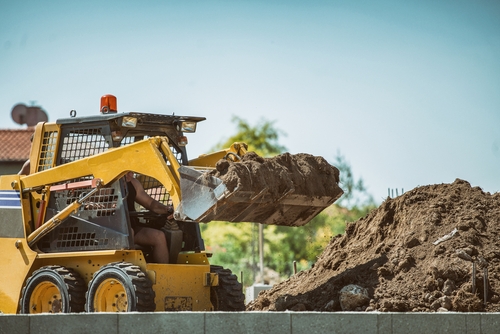
Whether you’re expanding or growing your business capabilities or have upcoming contracts requiring some machinery, acquiring heavy equipment will surely give your company the advantage it needs.
However, before you purchase heavy equipment, you should consider the equipment you need to support your company’s expertise. For example, a home renovation contractor will need mini excavators and multi-terrain loaders. Moreover, it helps to know and understand typical construction site accidents. This knowledge will aid you in selecting the appropriate equipment, promoting safe equipment operations, and effectively preventing such incidents.
So, if you’re thinking of investing in heavy machinery, here are some pieces of heavy equipment worthy of your money:
1. Mini excavators
Compact and small, these machines have the same capabilities as their larger counterparts. Mini excavators excel at close-quarter digging operations and are widely used in construction. If your business involves earthwork, you should consider investing your money in one of these machines. Here are some of the benefits of investing in a mini excavator:
-
Less noise – Compact excavators equipped with aftermarket rubber tracks produce less noise than full-size excavators. This can be very beneficial when working with home renovations where noise complaints are a common problem.
-
Lower fuel consumption – This type of excavator consumes less fuel. Additionally, you can also tow mini excavators using smaller trucks.
-
Versatility – Mini excavators can use attachments such as thumbs, breakers, and augers to accomplish various tasks.
-
Manoeuvrability – These types of excavators usually include features such as reduced tail swing, offset digging, and 360-degree turning, allowing them to work efficiently in tight spaces.
-
Less damaging – Mini excavators with rubber tracks can go over pavements without damaging them.
-
Easy to use – Most heavy equipment operators can quickly learn its user-friendly controls.

2. Multi-terrain loaders
Multi-terrain loaders, either wheeled or tracked, are commonly used in landscaping projects and commercial construction sites. These machines are used in various applications, such as digging and moving earth. They are versatile and durable and can withstand hours of rough work. Here are some of the benefits of investing in a multi-terrain loader:
-
Carry and load productivity – Multi-terrain loaders offer good lifting capabilities with short turning radius and fast cycle times. Some models may also feature traction control to enable its operators to be more efficient in various applications such as grading and digging.
-
Versatility – This type of loader is capable of using loader-specific attachments. The use of quick couplers easily interchanges buckets and pallet forks. Some quick coupling systems are also designed to minimize greasing, requiring fewer replacement parts and less maintenance.
3. Dump trucks
Dump trucks are some of the most versatile all-terrain vehicles. These trucks are commonly used to remove materials and debris from construction sites and are widely used to bring in materials such as soil and gravel. Generally, dump trucks are very useful in both the mining and construction industries. Additionally, it can also be equipped with a variety of advanced features. Here are some of the benefits of investing in a dump truck:
-
Various sizes – Nowadays, trucks are widely available in various sizes. Large trucks are more commonly used in the construction and mining industry, whereas the smaller-sized trucks are used in transporting materials and small scale mining. There are also trucks specifically designed for carrying heavy loads.
-
Efficiency – Without the use of a dump truck, the starting and completion stages of a construction project can be rather difficult. These trucks can be utilized to efficiently transport construction-related materials such as concrete, gravel, sand, and steel pipes.
-
Power – While other vehicles cannot operate efficiently when loaded with heavy materials, dump trucks are designed specifically to work in harsh working conditions. Features such as “power takeoff” provide dump trucks with significant power to lift heavy loads with its lifting mechanism.
4. Telehandlers
Many types of heavy equipment can be used to lift construction or any other materials, including a telehandler. They are equipped with telescopic booms, enabling them to reach upward and forward, along with various attachments such as lifting jibs, pallet forks, and buckets. Generally, telehandlers are cost-effective alternatives to the common crane. Here are some of the benefits of investing in a telehandler:
-
Versatility – Equipped with the right attachments, a telehandler can perform various tasks in various conditions, such as supply placement, material handling, personnel lifting, and snow removal.
-
Manoeuvrability – Telehandlers, with their compact and small bodies, are commonly used for various jobs in tight spaces. Some types of telehandlers even include 360-degree turn capabilities and continuously rotating turrets.
How To Choose Heavy Equipment
Are you ready to procure heavy equipment for your construction project? Before you do so, it’s crucial to learn how to choose the right one for you.
Choosing heavy equipment for your construction project requires careful consideration to ensure it meets project needs efficiently and cost-effectively. Initially, you must identify project requirements, including scope, terrain, site size, and unique constraints. Then, assess your equipment needs based on excavation, hauling, or lifting tasks, considering the capacity, digging depth, and horsepower.
Next, you must evaluate terrain conditions, soil, slope, and access to determine suitability. Decide between renting and purchasing based on project duration, frequency, and budget constraints. Prioritize fuel efficiency and environmental impact, opting for models meeting emission standards. Ensure safety features like rollover protection and backup cameras are included.
Furthermore, you must consider maintenance, spare parts availability, and reliable service. This helps prevent project delays when repair needs arise. Ensure operators receive proper training and certification. Compare upfront and operating costs and resale value, and seek advice from equipment dealers and industry experts. Following these steps, you can select the most suitable heavy equipment for your construction project, optimizing performance and safety while managing costs effectively.
Closing thoughts
When purchasing pieces of heavy equipment, make sure to do your research first. Check the machinery maintenance needs, availability of spare parts, and repair shops if your equipment needs repairs. Additionally, training your operators to use particular machinery can improve their productivity and lessen the need for premature maintenance.




 POSTED BY
POSTED BY 

